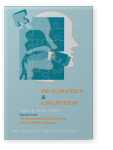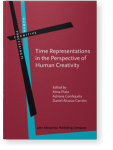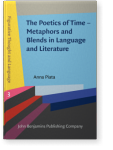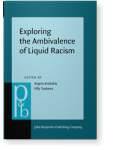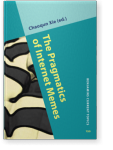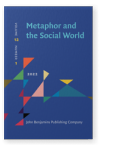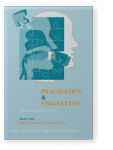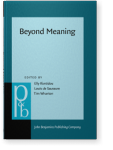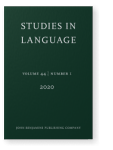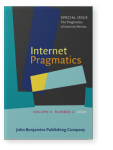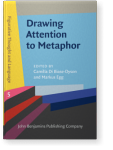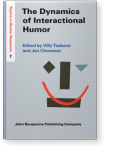Anna Piata
List of John Benjamins publications for which Anna Piata plays a role.
Journal
Titles
Time Representations in the Perspective of Human Creativity
Edited by Anna Piata, Adriana Gordejuela and Daniel Alcaraz Carrión
[Human Cognitive Processing, 75] 2022. viii, 245 pp.
Subjects Cognition and language | Cognitive linguistics | Discourse studies | Pragmatics | Theoretical literature & literary studies
The Poetics of Time – Metaphors and Blends in Language and Literature
Anna Piata
[Figurative Thought and Language, 3] 2018. xviii, 206 pp.
Subjects Cognitive linguistics | Discourse studies | Pragmatics | Semantics | Theoretical literature & literary studies
2024 Chapter 5. Liquid racism, metaphor and the visual modality Exploring the Ambivalence of Liquid Racism: In between antiracist and racist discourse, Archakis, Argiris and Villy Tsakona (eds.), pp. 118–142 | Chapter
The extant literature on liquid racism has focused primarily on the rhetorical impact of humor. In this Chapter, we shift the focus to the role of metaphor as a means of conceptualization. Drawing on ideas and tools from the fields of critical discourse studies, conceptual metaphor theory and… read more
2022 Chapter 3. What is time? Verbal creativity in copula constructions Time Representations in the Perspective of Human Creativity, Piata, Anna, Adriana Gordejuela and Daniel Alcaraz Carrión (eds.), pp. 61–80 | Chapter
The focus of this chapter is on poetic metaphors of time that appear in so-called equations, that is, copula constructions of the form ‘NP be NP’. While metaphorical creativity of time has been extensively and thoroughly studied, research on such metaphors is rather limited and mostly associated… read more
2022 Stylistic humor across modalities The Pragmatics of Internet Memes, Xie, Chaoqun (ed.), pp. 36–63 | Chapter
This paper is concerned with ‘Classical Art Memes’, a category of internet memes that distinctively derives its visual input from classical and medieval art. I specifically show that humor in Classical Art Memes arises from incongruity among different stylistic varieties, namely a colloquial… read more
2022 The affect bias in the metaphorical representation of anticipated events: The case of approach Metaphor and the Social World 12:1, pp. 115–137 | Article
When talking about anticipated events, speakers can conceptualize them either as destinations towards which they are moving or as entities moving towards them, which correspond to the Ego- and the Time-moving metaphors, respectively (cf. ‘We are approaching Christmas’ and ‘Christmas is… read more
2022 Introduction Time Representations in the Perspective of Human Creativity, Piata, Anna, Adriana Gordejuela and Daniel Alcaraz Carrión (eds.), pp. 1–12 | Chapter
2021 Metaphor and mental shortcuts: The role of non-propositional effects New Developments in Relevance Theory, Padilla Cruz, Manuel and Agnieszka Piskorska (eds.), pp. 299–320 | Article
Cognitive-pragmatic approaches to how metaphors are understood view the activation of perceptual or motor effects as inferred (Steinhart 2001; Bergen 2005; Wilson and Carston 2006; Carston 2010; Gibbs and de Macedo 2010; Wilson and Carston 2019). Crucially, inferences elicit conceptual… read more
2021 Conceptual mappings and contextual assumptions: The case of poetic metaphor Beyond Meaning, Ifantidou, Elly, Louis de Saussure and Tim Wharton (eds.), pp. 79–98 | Chapter
This chapter is concerned with what has traditionally been considered as ‘beyond meaning’: poetic metaphor. It specifically focuses on poetic metaphors of time, with the aim to address anew the relationship between pragmatic and cognitive linguistic approaches to metaphor (cf. Tendahl and Gibbs… read more
2020 On the polysemy of motion verbs in Ancient Greek and Coptic: Why lexical constructions are important Studies in Language 44:1, pp. 27–69 | Article
In this paper, we propose a constructional analysis of the meanings of two generic motion verbs in Ancient Greek and Coptic (Sahidic dialect), the verbs baínō and bôk, respectively, both of which are glossed as ‘go’ and are characterized by extensive polysemy. We argue that an adequate analysis… read more
2020 Stylistic humor across modalities: The case of Classical Art Memes The Pragmatics of Internet Memes, Xie, Chaoqun (ed.), pp. 174–201 | Article
This paper is concerned with ‘Classical Art Memes’, a category of internet memes that distinctively derives its visual input from classical and medieval art. I specifically show that humor in Classical Art Memes arises from incongruity among different stylistic varieties, namely a colloquial… read more
2020 Is all poetic metaphor deliberate? Exploring the relationship between verbal creativity and deliberateness Drawing Attention to Metaphor: Case studies across time periods, cultures and modalities, Di Biase-Dyson, Camilla and Markus Egg (eds.), pp. 207–228 | Chapter
The present study focuses on poetic metaphor with the aim to explore the relationship between verbal creativity and deliberateness. It has been suggested that novel metaphors are typically deliberate, although this does not mean that all conventional metaphor is necessarily non-deliberate (Steen,… read more
2018 Chapter 11. On-line humorous representations of the 2015 Greek national elections: Acting and interacting about politics on social media The Dynamics of Interactional Humor: Creating and negotiating humor in everyday encounters, Tsakona, Villy and Jan Chovanec (eds.), pp. 257–282 | Chapter
The recent development of social media platforms has given rise to new forms of digital communication in which humor seems to play a prominent role. This chapter is concerned with humor in such a newly emerged, mediated genre, so-called internet memes (i.e. units of image, text, animation, and/or… read more
